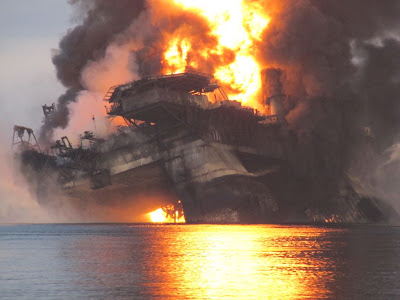“Obama’s Katrina”: that was the line from some pundits and news sources, as they tried to blame the current administration for the gulf oil spill. It was nonsense, of course. An Associated Press review of the Obama administration’s actions and statements as the disaster unfolded found “little resemblance” to the shambolic response to Katrina — and there has been nothing like those awful days when everyone in the world except the Bush inner circle seemed aware of the human catastrophe in New Orleans. Yet there is a common thread running through Katrina and the gulf spill — namely, the collapse in government competence and effectiveness that took place during the Bush years.
The full story of the Deepwater Horizon blowout is still emerging. But it’s already obvious both that BP failed to take adequate precautions, and that federal regulators made no effort to ensure that such precautions were taken. For years, the Minerals Management Service, the arm of the Interior Department that oversees drilling in the gulf, minimized the environmental risks of drilling. It failed to require a backup shutdown system that is standard in much of the rest of the world, even though its own staff declared such a system necessary. It exempted many offshore drillers from the requirement that they file plans to deal with major oil spills. And it specifically allowed BP to drill Deepwater Horizon without a detailed environmental analysis…
For the Bush administration was, to a large degree, run by and for the extractive industries — and I’m not just talking about Dick Cheney’s energy task force. Crucially, management of Interior was turned over to lobbyists, most notably J. Steven Griles, a coal-industry lobbyist who became deputy secretary and effectively ran the department. [In 2007 Mr. Griles pleaded guilty to lying to Congress about his ties to Jack Abramoff.] Given this history, it’s not surprising that the Minerals Management Service became subservient to the oil industry — although what actually happened is almost too lurid to believe. According to reports by Interior’s inspector general, abuses at the agency went beyond undue influence: there was “a culture of substance abuse and promiscuity” — cocaine, sexual relationships with industry representatives, and more. Protecting the environment was presumably the last thing on these government employees’ minds…
What really needs to change is our whole attitude toward government. For the troubles at Interior weren’t unique: they were part of a broader pattern that includes the failure of banking regulation and the transformation of the Federal Emergency Management Agency, a much-admired organization during the Clinton years, into a cruel joke. And the common theme in all these stories is the degradation of effective government by antigovernment ideology. Mr. Obama understands this: he gave an especially eloquent defense of government at the University of Michigan’s commencement, declaring among other things that “government is what ensures that mines adhere to safety standards and that oil spills are cleaned up by the companies that caused them.”
Yet antigovernment ideology remains all too prevalent, despite the havoc it has wrought. In fact, it has been making a comeback with the rise of the Tea Party movement. If there’s any silver lining to the disaster in the gulf, it is that it may serve as a wake-up call, a reminder that we need politicians who believe in good government, because there are some jobs only the government can do.
Krugman calls it an anti-government ideology. I haven’t really thought of it that way. It seems like an ideology ought to be stated as a positive set of ideas. But…
| i·de·ol·o·gy /ËŒaɪdiˈɒlÉ™dÊ’i, ˌɪdi-/ [ahy-dee-ol-uh-jee, id-ee-]
–noun, plural -gies.
|
There does seem to be a set of ideas that drove the people who ran our government for the last eight years. And I can see why Krugman calls it an anti-government ideology. What bothers me is that it’s hard for me to see that the government shrunk any, or cost any less. It grew, and it cost more – by any criteria. The government policy was oriented towards business objectives in every sphere – so environmental and financial regulation was either systematically disassembled or ignored wherever possible. Anything that stood in the way of large businesses was a bad thing – dismissed with a sneer. We returned to the world of the Industrial Revolution that prevailed at the turn of the [former] last century. I saw it as an irresponsible ideology myself.

deepwater horizon – the Bush Administration legacy
Sorry, the comment form is closed at this time.